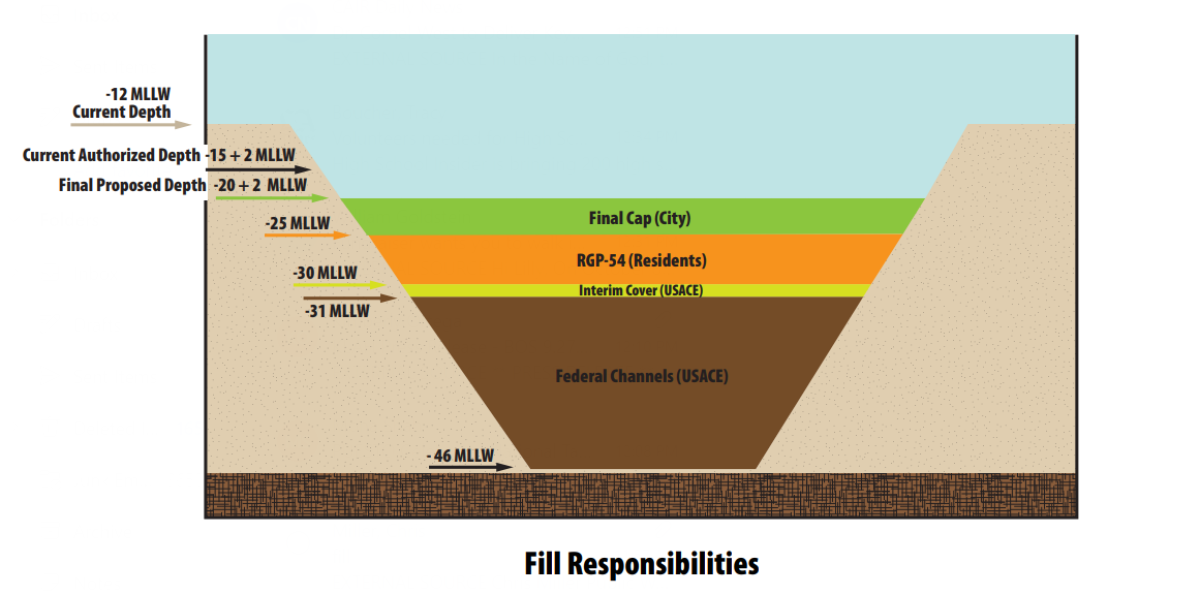OC Coastkeeper files lawsuit against U.S. Army Corps of Engineers over proposed disposal site

Another federal lawsuit has been filed against the U.S. Army Corps of Engineers over Newport Beach’s confined aquatic disposal site, this time by OC Coastkeeper, which argues the project is in violation of the Endangered Species Act, the National Environmental Policy Act and the Administrative Procedure Act.
The lawsuit was filed in U.S. District Court March 20 and names the U.S. Army Corps of Engineers along with Lt. Gen. Scott Spellmon, acting in his capacity as the chief of engineers and commanding general of the corps, as defendants.
At the core of the lawsuit and another filed Feb. 28 by Friends of Newport Harbor, accusing the agency of Freedom of Information Act violations, is the confined aquatic disposal site, also known as a CAD, to be placed in Newport Harbor. The site is intended to contain dredged material from the federal channels that is deemed unsafe for ocean release. The harbor requires regular dredging to maintain water navigation.
The first phase of the most recent dredge was completed last summer, with the second expected to begin in coming weeks. Once dredged, the tainted sediment will be put inside of the CAD and topped with 1 foot of sand for two years.
Both groups who have filed lawsuits over the project have long contested the safety of the site, arguing that the sediment was wrongfully characterized as harmless. But so far their efforts have been to little avail, as the Coastal Commission handed down its approval of the CAD last October.
“This filing should not come as a surprise to the Army Corps of Engineers. Coastkeeper submitted our Endangered Species Act (ESA) concerns, among other concerns over the project, in April 2022 during the draft Environmental Assessment public comment period,” said OC Coastkeeper founder and president Garry Brown in a statement Wednesday. “We never received a reply to our comment letter and later learned the Army Corps had misplaced it.
“After the final environmental assessment was released, Coastkeeper filed a notice of intent to sue months ago over our ESA concerns. Our team went forward with the complaint after not hearing from the Army Corps during the notice period.”
Brown said that in addition to concerns about violations of the Endangered Species Act, the organization believes there has been a lack of alternative analyses and what he described as a “piecemeal approach to evaluating the environmental impacts of the larger dredging and CAD facility project.”
“For years, we have been asking for an earnest evaluation of the larger project’s holistic environmental impacts. Unfortunately, these calls have gone unanswered, so we’re moving forward with legal action,” Brown said.
A request for comment from the U.S. Army Corps of Engineers was not returned.
The complaint states that lower Newport Bay is home to a number of threatened or endangered species, and “the site of extensive additional legacy environmental pollution in the form of other contaminants. Much of this pollution is interred in the sediments that make up the shoals in the federal navigation channel and elsewhere in Lower Newport Bay.”
It also touches on a recent infestation of the green alga Caulerpa prolifera in Newport Harbor, which reproduces quickly by fragmentation.
The lawsuit maintains that OC Coastkeeper has commented on the project at every turn, but the Corps hasn’t acknowledged possible adverse effects on existing marine life, potential proliferation of the invasive algae and the potential for sediment suspension as a whole. Further, it alleges the Corps failed to consult with federal environmental agencies regarding impacts on the bay.
The suit also argues that the National Environmental Policy Act and the Administrative Procedure Act were violated as the Corps did not prepare an environmental impact statement and authorized the project through a final environmental assessment and Finding of No Significant Impact (FONSI) instead.
Attorneys for OC Coastkeeper are seeking a declaration that the U.S. Army Corps of Engineers is in violation of the EPA’s procedural requirements by failing to consult with U.S. Fish and Wildlife and the National Marine Fisheries Service on the project’s impacts; that the Corps is in violation of the ESA’s requirements by failing to ensure that it would not jeopardize endangered or threatened species; and that the Corps was in violation of the NEPA and APA in its decision to not issue an Environmental Impact Statement, or EIS.
The suit requests a declaration that the Corps’ issuance of the final environmental assessment and FONSI were “arbitrary, capricious, an abuse of discretion, or otherwise not in accordance with law” and to vacate said final EA and FONSI and the Corps’ approval of the CAD construction permit. It also asks for injunctions on several counts, largely meant to inhibit the Corps’ ability to see the project through until an EIS is done, along with attorneys’ fees and costs.
“This project poses serious environmental risks that haven’t been adequately investigated as required by federal law, including the Endangered Species Act,” said Christopher Sproul, senior counsel at Environmental Advocates, which is representing OC Coastkeeper. “It appears clear that there are less environmentally risky alternatives that should be explored and would likely prove feasible given further investigation.”
All the latest on Orange County from Orange County.
Get our free TimesOC newsletter.
You may occasionally receive promotional content from the Daily Pilot.




